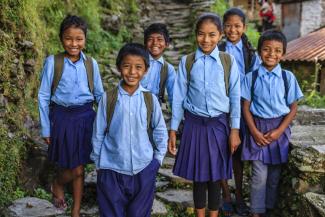
Do the preparation task first. Then read the article and do the exercises.
Preparation
What was your childhood like?
Childhood is a universal experience, something every adult across the world has gone through. For many, childhood is a time we are nostalgic for. It’s a time of curiosity, imagination, exploration and incredible development. The fact that you are reading this article possibly means that you had a fortunate childhood that shaped you into the motivated adult you are today – here, improving your English skills. But what helped to get you this far? Who inspired you along the way? For many of us, a special adult helped us to learn and grow as children and led us to love learning. For some, it was a great teacher or wise neighbour. Others had parents, grandparents or other relatives who encouraged them to be curious and study hard. Even if your childhood wasn’t easy, you probably had at least one inspirational adult in your life who encouraged you and was a role model.
What difficulties do children face?
Unfortunately, not everyone has a good childhood. Proportionately, more children live in poverty than adults. 19.5 per cent of the world’s children live in extreme poverty, and even though children are only one third of the global population, they are half of the poor. Around the world, many children live without access to clean water, enough food, or decent healthcare. Others live in extremely dangerous places and some are forced to join armies to fight wars they don’t understand. Over 120 million children do not attend school and even those who do are not always learning: two out of five students leave primary school not knowing how to read, write or do basic maths. Even those who may have happy memories of childhood did not necessarily have an easy life as a kid. Children are dependent on the adults in their life for support, and not all adults treat children well.
What’s so special about 20 November?
Even though every day is, or at least should be, a day to nurture and celebrate children, Universal Children’s Day is celebrated as a special day around the world on 20 November. In 1989 the United Nations Convention on the Rights of the Child – a 54-item list describing the universal rights of children – was signed. This document came out of the work of a lot of experts and representatives from many nations who met to create a child-specific version of the Universal Declaration of Human Rights that was signed in 1948. The Convention on the Rights of the Child is the most widely and quickly signed treaty in history, meaning it was quickly adopted into the civil codes of most countries around the world.
What are human rights? And what are the rights of a child?
The Universal Declaration of Human Rights says that there are basic rights and freedoms that every human is entitled to, regardless of race, sex, language, religion, or anything else that may divide people. The Rights of the Child recognises that people under the age of 18 have specific needs and are entitled to their own rights. There are four main principles that these rights follow: non-discrimination, the best interests of the child, the right to life, including survival and development, and the right to be heard and taken seriously. According to this, every child has the right to safety, to care, to education, to play, to rest and to know their rights!
What can we do?
The Convention on the Rights of the Child is the world’s promise to children that we, the adults, will do everything in our power to protect them, to educate them, and to help them grow. Are you helping keep this promise? There is a lot to be done to make the world a safer, more supportive place for children. The good news is, you’re an adult and you have the power to influence the next generation in the most wonderful way. Start by explaining the Rights of the Child to the children in your life. Let them know that they, just like all human beings, have rights. Help a child learn to love learning, so they can become a motivated adult just like you.




WELL STORY BROTHER.🥰
What adult inspired you when you were a child?
when I was a child my elder brother inspire me and he always supports me in my study. I love him a lot. he inspires me and teach me for my exam and at that time I always learn something but after completing my 1year at my university. I lose my brother forever after my brother's death nobody supports me and inspire me. it has been completed 6years and in 2021 one of my new friends inspired me for the study and he always give same motivation as my brother, so I decided to learn the language and improve myself for my future.
Hello jyoti Chaudhary,
I was sorry to hear about your brother.
We're glad to have you on LearnEnglish!
All the best,
Kirk
The LearnEnglish Team
My grand father was my role model.
He had experienced very emotional and difficult things during his live but was not eager about it.
He was always trying to learn and to read to understand better his world.
His kindness had no equal.
Just being around and being loved by him was a treasure and a chance that helped grow and become the person I am today.